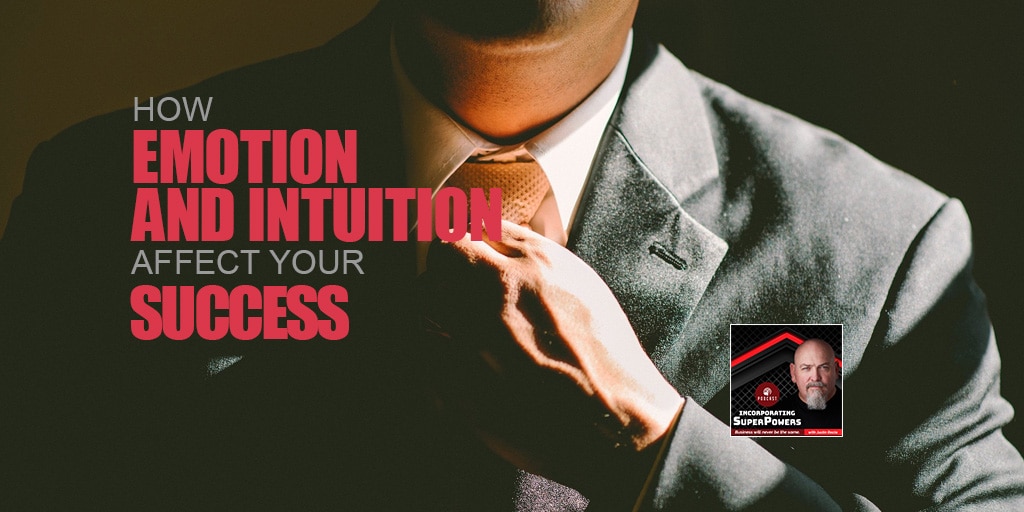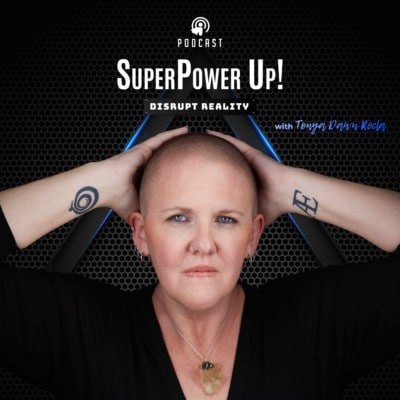
Welcome to Incorporating SuperPowers. I am your host Justin Recla, and today I’m super excited to introduce you to my guest.
Scott Carson is somebody that’s been in the business world for a long time. He’s doing some great things out there. We met at Secret Knock, I don’t know, five or six years ago now. Maybe even longer than that.
I think it actually might be seven years now, actually thinking about. Yeah.
I think it was. I think it was almost right after we left the government, right when we were first stepping into business. Greg put us into his stage for the first time and I think that’s where you and I met.
Scott and I haven’t connected in a long time, but I went back and just looked at some of the stuff and I was like, “Boom, I got it, I know exactly what we’re talking about today, and this seems to be kind of a theme today.” Especially with us guys, is this tapping into some of these things that most people would think would be very feminine, but they’re not. They’re extremely masculine, and we’re bringing it to the forefront.
So one of the things I want to talk to you, Scott, today about is how emotion and intuition affect your success. So Scott, thanks for joining us on the show today.
Man, first and foremost, I’m so honored to be here. Thank you for having me. You’re doing amazing things over there.
Everybody listening, go out subscribe, give a review right now. While you’re thinking about it, hit it. I’m honored to be here, and just jacked up as always. You’re doing some great stuff. We’ve gone too long without visiting man. We’ve got to do it much more often on a regular basis. Don’t we, Justin?
Yeah. We really do. It’s all about the connection. You’ve been up in your world. I’ve been up in my world. Ironically though the worlds seem to be getting smaller, and smaller, and closer, and closer together. So I’m glad that you’ve been able to join us here on the show, and I think this will just open up even more conversations as we unfold. Let’s just dive down the rabbit hole here. We were talking a little bit briefly before the show about how emotion and intuition have had an impact on your own success. What does that mean and how have you used emotion and intuition in your own journey?

I’m a big believer that you’ve got to trust your gut, and that’s your intuition talking to you.
Well, I will tell you this, the two are kind of separate, but obviously connected. I’m a big believer that you’ve got to trust your gut, and that’s your intuition talking to you. Some guts are a little bit bigger than others. You know? I like to joke that mine was sponsored by Crown Royal and Rib Eye Steaks for a couple years, but I will tell you this, we all have a sixth sense still. It’s still the animalistic behavior, and if something doesn’t feel right, trust your gut. Any time I’ve ever gone against my gut and my intuition, it’s done me wrong, whether it was stepping outside of my normal, I like to say, traffic lanes of highway with my business. It did me wrong.
Any time I was able to listen to my gut and stick to it, it always did me well. But it’s also life is such full of emotions, and it’s not nearly black and white as much as we’d like it to be. There’s a lot of gray, and the emotions I think in our lives live in that gray area, I like to joke about the 50 Shades of Gray. We have 50 shades of emotions from time to time that affect how we act. And one of the things in our business, we deal with a lot of emotions as far as especially dealing with borrowers, and foreclosures, and people making their mortgage payments or not in my little niche of real estate investing. We also have emotions of getting deals closed. It gets stressful. We’re trying to close on real estate and things like that, so a lot of emotions, and the more you can kind of control them, great, the better off you’re going to be, and the more you can make educated decisions in your business versus emotional decisions you’ll be a lot better off.
I see, and I know that you do as well Justin, see a lot of people that can’t control their emotions. They go off half cocked, or they get a little crazy there. They’re shooting from an emotional place. I have noise machines here, but anyway.
He’s his own sound effects studio, fellas. He’s using his own sound effects dude. This is awesome. No editing required here.
Exactly. But whenever you make an emotional decision it often ends up hurting you. You have to sit back, take the heart out of the decision, and keep the brain into it. Now, it’s good, don’t get me wrong. I’m not telling you, you can’t be emotional and passionate about some things, but you’ve got to make your decisions based on numbers, based on experience, and go from there. Now, I’m not saying that you can’t be emotional in getting up to that point, but the final yes or no, whether to proceed, you’ve got to definitely take the emotions out of it. Oftentimes, you’re going to be coming from a background or a place that really is going to steer you wrong in whatever you’re working on or whatever that decision has to be.
I absolutely love that, because I think especially in your industry that the emotional piece of buying, especially real estate, buying notes, there’s a lot of emotional energy there, because it’s like you buy this note, and most people that are coming into the market in your industry all they see is the backside of it. Like, “Whoa if I get this, on the backside of it, I made a $60000 or $50000 profit,” and there are lots of emotions to that. Let’s just call out the elephant in the room. This is what I like to do on this show here. What is that elephant in the room in your industry that people know is out there that doesn’t feel good to them? What is that?
There are two things. I call it OTSC syndrome in real estate, and what OTSC stands for, oh, that’s so cute. People are looking at a house online, “Oh my gosh.” It’s like the whole HGTV, “Oh, I’m going to fall in love.” I’m like, “Uh-uh, take the emotion out of it and shove it to the side. Let’s look at the numbers. Does the number make sense?” If the numbers make sense, then we’ll take that next step of paint colors, and stuff like that but if the numbers don’t make sense, hey, cut it loose and move on to the next one. And so that’s kind of what it looks like with us on a lot of the front-end side, but the emotional side too, especially when we’re dealing with distressed debt, and borrowers who are struggling to make their payments.
It’s an emotional struggle in some cases every day as we or our vendors are reaching out to these homeowners where we’ve bought the debt and become the bank really trying to negotiate with the home owners like, “Listen, hey Mrs. Smith, I know you’ve been out of work for two years, you’re back to work, let’s first and foremost try to take a deep breath. I’m not Wells Fargo. I’m not Bank of America. I’m not your previous bank. You’ve got a fresh start with me. What can you afford? Are you working again? I know you haven’t paid in two years and the bank wanted all 24 or 36 months of it. Let’s just take it easy. What can you pay today and let’s get you on the road to recovery?” And you have to kind of sometimes just let people vent a little bit; let them get that emotional frustration out of the way, because it bottles up sometimes.
Yeah
And once that’s done, then you come just like, “Okay, you’re an adult, I’m an adult. Let’s actually have an adult conversation.” I cuss, anyway, like it is, I drop a few F-bombs in here, but when I’m talking to a bar I can’t do that. I’m talking to a client, I can’t do that. I’ve got to sit there and listen, and I think one of the most powerful things that you can do, and this was taught to me years ago in a sales training, that if you’re dealing with an emotional person, the worst thing you can do is just come back at them. If they’re yelling at you, the worst thing you can do is come back at them and mirror them, because that’s all you’re going to get.
Now it creates a fight, especially when you’re talking about somebody’s home, right?
Yeah.
When you’re talking about, you’re coming in and you’re trying to assist them. I had a friend of mine, he’s in the same industry as you, had a situation. Came in to help this woman out. She was $15,000 behind on her mortgage. He came in, was able to assume the debt, and was going to help revamp the home because it had some fire damage and what not, and he was going to keep her in there.
Nice.
She was fine with it. They came to great terms. The city, long story short, the city screwed things up and costs this woman her home. You know what my buddy did? He painted the entire house bright orange, hunter orange, because the city was saying that the house didn’t exist and it burnt up. Right? So, at the end of the day, it’s about helping people, right?
Yeah.

I think the best thing people could do is just turn off the T.V., turn off the social media, and let’s just have an intelligent conversation.
Whether it be helping the bad situation and converting it, or finding another home and building it up and providing a place for people to go, and that’s what I love about your industry. At first, when I first saw it, I didn’t understand it, I didn’t get it, but when I dove into it and say it, I was like, “Ah, this is really about helping people.” Yeah, you’re going to make a pretty penny on the back end, but at the end of the day it’s about connecting with people, which is why I love conversation of emotion and intuition, because in your industry especially, like you just identified, there could be a ton of emotion when dealing with clients.
It totally came be, but it’s just not in real estate. You look at the whole world these days, especially the United States. It’s such a hotbed of emotion, whether you like the guy in charge or you don’t like the guy in charge. Politics these days, oh my gosh, that’s emotionally heated. You’ve got so much things happening, and sometimes you’ve just got to step away. I think the best thing people could do is just turn off the T.V., turn off the social media, and let’s just have an intelligent conversation. Both sides are right, both sides are wrong. The right is somewhere in the middle, but what gets so crazy out there is when everybody gets emotionally heated they focus on that emotion and that hot button versus actually deciding to solve the underlying issue, whether it is to build a way, whether it’s not to build a wall, whether it’s to let people in or not let people in, or whatever your tax bracket is.
Let’s figure out solving the issues versus just getting in a fight and sitting here and making it 10 times worse, because we get carried away. There are emotions versus actually being focused on solid discussion and solid problem solving techniques.
Yeah, absolutely. And if you can’t separate out the two you probably shouldn’t be making decisions, especially when it comes to your own business and especially when it comes to the livelihood of other people, and in the housing industry, that is something huge that you have to take into consideration. Well, we’ve got to go on break right quick. Talking to my friend Scott Carson about how emotion and intuition can affect your success. Scott, before we go out on break, where can people go find you?
Easiest way is just to go to my website, weclosenotes.com. Everything is there that we’ve got. It’s weclosenotes.com. That’s where you’re going to meet the money.
Cha-ching. See, he’s got sound effects. You’re hired. You’re now part of the team. Awesome. You are listening to Incorporating Superpowers. We’re talking to Scott Carson about how emotion and intuition can affect your success. Stay tuned. We’ll be right back.
To listen to the entire show click on the player above or go to the SuperPower Up! podcast on iTunes.
Podcast: Play in new window







